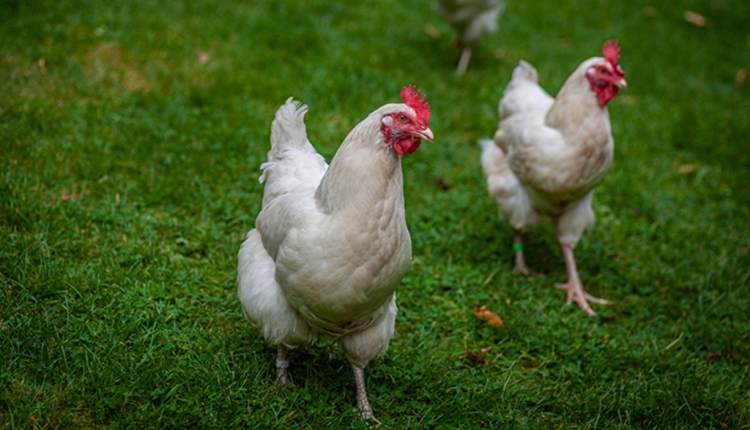Sequestration went into effect on March 1 as a result of the Budget Control Act. And with it, the federal budget will be reduced by $85 billion this year or $1.2 trillion over the next decade if congressional leaders don't take any further action. While billions and trillions sound like large numbers - and they are - those cuts represent a mere 2 percent or so of the overall federal budget since some programs will receive no cuts.
 For those of us operating dairy farms, we have faced steeper cuts in an attempt to simply cover escalating feed costs on our farms over the past half decade. Overall, budget cuts will range from 5 to 8 percent, depending on how one calculates the numbers. "Basically, it's fairly safe to say there will be no area in the USDA's domain that is untouched with one really big exemption," said Andrew Novakovic, an agricultural economics professor at Cornell.
For those of us operating dairy farms, we have faced steeper cuts in an attempt to simply cover escalating feed costs on our farms over the past half decade. Overall, budget cuts will range from 5 to 8 percent, depending on how one calculates the numbers. "Basically, it's fairly safe to say there will be no area in the USDA's domain that is untouched with one really big exemption," said Andrew Novakovic, an agricultural economics professor at Cornell.
"When Congress wrote the Budget Control Act, they specifically exempted a number of very large entitlement programs. Medicare and Social Security chief among those, but also food stamps or SNAP (Supplemental Nutrition Assistance Program) were completely exempted," said Novakovic, noting there would be no impact on benefits paid under those programs. "Also, the Conservation Reserve Program (CRP) is protected by virtue of it being a contractual agreement with farmers to set aside those lands," said Novakovic, noting all others are subject to sequestration, in a podcast that can be found by clicking here.
There has been some talk on the news about the furlough of inspectors for meat plants and how this could affect the food supply. DTN's Chris Clayton reported in his blog, "For USDA, the cuts are effectively 5 percent across the board for the rest of the budget year. One of the biggest impacts could be furloughs of meat inspectors for the Food Safety Inspection Service (FSIS)," he said. "At the Commodity Classic on Friday, Agriculture Secretary Tom Vilsack pointed out 87 percent of the budget for FSIS is payroll for inspectors," reported Clayton. "That means FSIS inspectors could face up to 22 days of furloughs."
"There are some executives who are exploring staging the timing of furloughs so there wouldn't be one day each week that every meat plant in the United States couldn't be open," said Novakovic in a podcast co-hosted by Mark Stephenson, the University of Wisconsin's director of dairy policy analysis. "But it would be like a rolling blackout, somewhere on any day a meat plant would be closed because they couldn't get an inspector there."
Since dairy isn't selling many products to the government, there shouldn't be as of an much issue. However, dairy could have its concerns depending how government officials implement the mandated cuts.
"The Office of Management and Budget (OMB) has responsibility for determining the perimeters, the rules by which agency has to make cutbacks," said Novakovic. "Other time periods when there have been cutbacks that were required because of a failure to pass a budget or an appropriation, USDA and other agencies would have to do some fancy footwork to save some money but they could also prioritize," said Novakovic. "In this case, OMB is saying, no, you can't exempt any area. Every area is going to take a cut," said Novakovic.
This even included programs with user fees. "In dairy the big one is the Federal Milk Market Orders which are essentially entirely paid for by assessments made on processors," noted Novakovic even though that is fully funded.
Could MILC (Milk Income Loss Program) contracts be impacted?
The CCC (Commodity Credit Corporation) is subject to sequestration. "That means any program that comes out of the CCC, like MILC payments or payments made to crop farmers for marketing loan guarantees, are subject to sequestration," said Novakovic. "The estimate of that was 7.6 percent reduction. That percentage is probably going to get re-evaluated as they get some fresh numbers."
The last time the federal government faced sequestration was through Gramm Rudman. "It seemed like we played lots of games with Gramm Rudman," said Stephenson. "Is that going to happen this time around?" he asked.
"I doesn't look like it," said Novakovic when reflecting on the 1980's legislation. "The Gramm Rudman bill did include sequestration, but it also gave Congress other incentives or opportunities to find ways to close budget gaps. In dairy, of course, the infamous one was the Gramm Rudman assessments. In that environment one way to close the gap was to just charge farmers.
"It is really clear that there is no environment to politically support that," said Novakovic. "Legally, Congress could do that. But politically it's clear those kinds of alternatives simply will not fly. That leaves you with this meat ax, across the board cutting."
There are some other ways in which we could see some impacts for dairy.
"Folks who are active in futures markets may have noticed that the CME just recently put out a one-page letter talking about the possible effects of sequestration," said the Cornell professor. "At first blush, what would that be because the CME is a private business? Well in fact what they (CME) are concerned about is timely price reporting and being able to do for example a cash settle contract when you do know the price.
"The Dairy Market News program is subject to sequestration. The dairy mandatory price reporting could possibly be affected by furlough," said Novakovic. "This doesn't mean they could be done, but it could mean there could be some awkwardness in the timeliness of the reporting of these things because we might see delays because folks are being forced to take the day off," he suggested.
 For those of us operating dairy farms, we have faced steeper cuts in an attempt to simply cover escalating feed costs on our farms over the past half decade. Overall, budget cuts will range from 5 to 8 percent, depending on how one calculates the numbers. "Basically, it's fairly safe to say there will be no area in the USDA's domain that is untouched with one really big exemption," said Andrew Novakovic, an agricultural economics professor at Cornell.
For those of us operating dairy farms, we have faced steeper cuts in an attempt to simply cover escalating feed costs on our farms over the past half decade. Overall, budget cuts will range from 5 to 8 percent, depending on how one calculates the numbers. "Basically, it's fairly safe to say there will be no area in the USDA's domain that is untouched with one really big exemption," said Andrew Novakovic, an agricultural economics professor at Cornell. "When Congress wrote the Budget Control Act, they specifically exempted a number of very large entitlement programs. Medicare and Social Security chief among those, but also food stamps or SNAP (Supplemental Nutrition Assistance Program) were completely exempted," said Novakovic, noting there would be no impact on benefits paid under those programs. "Also, the Conservation Reserve Program (CRP) is protected by virtue of it being a contractual agreement with farmers to set aside those lands," said Novakovic, noting all others are subject to sequestration, in a podcast that can be found by clicking here.
There has been some talk on the news about the furlough of inspectors for meat plants and how this could affect the food supply. DTN's Chris Clayton reported in his blog, "For USDA, the cuts are effectively 5 percent across the board for the rest of the budget year. One of the biggest impacts could be furloughs of meat inspectors for the Food Safety Inspection Service (FSIS)," he said. "At the Commodity Classic on Friday, Agriculture Secretary Tom Vilsack pointed out 87 percent of the budget for FSIS is payroll for inspectors," reported Clayton. "That means FSIS inspectors could face up to 22 days of furloughs."
"There are some executives who are exploring staging the timing of furloughs so there wouldn't be one day each week that every meat plant in the United States couldn't be open," said Novakovic in a podcast co-hosted by Mark Stephenson, the University of Wisconsin's director of dairy policy analysis. "But it would be like a rolling blackout, somewhere on any day a meat plant would be closed because they couldn't get an inspector there."
Since dairy isn't selling many products to the government, there shouldn't be as of an much issue. However, dairy could have its concerns depending how government officials implement the mandated cuts.
"The Office of Management and Budget (OMB) has responsibility for determining the perimeters, the rules by which agency has to make cutbacks," said Novakovic. "Other time periods when there have been cutbacks that were required because of a failure to pass a budget or an appropriation, USDA and other agencies would have to do some fancy footwork to save some money but they could also prioritize," said Novakovic. "In this case, OMB is saying, no, you can't exempt any area. Every area is going to take a cut," said Novakovic.
This even included programs with user fees. "In dairy the big one is the Federal Milk Market Orders which are essentially entirely paid for by assessments made on processors," noted Novakovic even though that is fully funded.
Could MILC (Milk Income Loss Program) contracts be impacted?
The CCC (Commodity Credit Corporation) is subject to sequestration. "That means any program that comes out of the CCC, like MILC payments or payments made to crop farmers for marketing loan guarantees, are subject to sequestration," said Novakovic. "The estimate of that was 7.6 percent reduction. That percentage is probably going to get re-evaluated as they get some fresh numbers."
The last time the federal government faced sequestration was through Gramm Rudman. "It seemed like we played lots of games with Gramm Rudman," said Stephenson. "Is that going to happen this time around?" he asked.
"I doesn't look like it," said Novakovic when reflecting on the 1980's legislation. "The Gramm Rudman bill did include sequestration, but it also gave Congress other incentives or opportunities to find ways to close budget gaps. In dairy, of course, the infamous one was the Gramm Rudman assessments. In that environment one way to close the gap was to just charge farmers.
"It is really clear that there is no environment to politically support that," said Novakovic. "Legally, Congress could do that. But politically it's clear those kinds of alternatives simply will not fly. That leaves you with this meat ax, across the board cutting."
There are some other ways in which we could see some impacts for dairy.
"Folks who are active in futures markets may have noticed that the CME just recently put out a one-page letter talking about the possible effects of sequestration," said the Cornell professor. "At first blush, what would that be because the CME is a private business? Well in fact what they (CME) are concerned about is timely price reporting and being able to do for example a cash settle contract when you do know the price.
"The Dairy Market News program is subject to sequestration. The dairy mandatory price reporting could possibly be affected by furlough," said Novakovic. "This doesn't mean they could be done, but it could mean there could be some awkwardness in the timeliness of the reporting of these things because we might see delays because folks are being forced to take the day off," he suggested.








